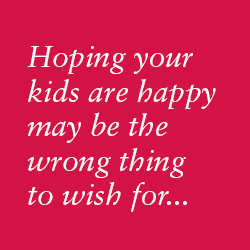Ignatian Spirituality: The Fourth Day | Fall 2017
By Rev. Anthony D. Andreassi, CO, Ph.D.
Director, Senior Christian Service
Faculty Member, History Department
 As a high school teacher for more than 20 years and a priest for more than a decade, I have lost count of the number of times a parent has said words to this effect: I don’t care what my kids do or whom they become, as long as they are happy. While I am sure spoken from a place of love and concern, a statement like this is dangerous. A highly valorizing and emotional state like happiness can be a risky enterprise given that emotions can and often do change moment to moment.
As a high school teacher for more than 20 years and a priest for more than a decade, I have lost count of the number of times a parent has said words to this effect: I don’t care what my kids do or whom they become, as long as they are happy. While I am sure spoken from a place of love and concern, a statement like this is dangerous. A highly valorizing and emotional state like happiness can be a risky enterprise given that emotions can and often do change moment to moment.
I have felt this way in my gut for many years but was not able to articulate it well. Not being a parent, I was hesitant to explore let alone express this spiritual truth. But in a recent column in the London Tablet by Australian Jesuit Richard Leonard not only did I find a thoughtful examination of what I had thought for some time—but some deadly implications it suggests.
Father Leonard notes the shocking reality that the second leading cause of death of young people under 30 in the developed world is suicide. In the U.S. alone, one in five adults take a prescription drug for either depression or anxiety. Young people living in places with some of the highest standards of living in human history and opportunities far beyond the imagination of most other people on earth should, one would suspect, have the most to live for and find contentment in. At least for some, the opposite seems to be the case. For members of Generation X, perhaps the most socially connected ever thanks to technology and social media, feelings of disconnect and deep unhappiness appear, according to Fr. Leonard, to be like a pandemic.
However, for the Christian, there is a spiritual truth that can help to shape one’s attitude toward life and stand as a counter-narrative to the lie that the meaning of life is the pursuit and constant attainment of happiness. I think this is true for both parents trying to raise Catholic kids as well as we adults as we pursue our own lives.
In getting at this spiritual truth, Father Leonard raises a rhetorical but provocative question which till recently I did not have the courage to speak aloud. When asked what they want for a daughter or son, Father Leonard wonders why Catholic parents don’t just say that they want their child to be happy—but rather that they would hope she or he would be “faithful, hopeful, loving, just, and good.” In so many ways these are radically different responses.
Pursuing virtues like holiness and faithfulness will not always lead to happiness. But it should be our deep Christian conviction that trying to pursue these virtues will bring us things far more valuable and lasting. They can bring us joy.
It is critical to define the difference between joy and happiness since the distinction is not readily apparent. For this, Father Leonard’s words are worth quoting verbatim:
“Christian joy celebrates that we know where we have come from, why we are here, and where we are going. It moves away from trying to find the easy side of life to confronting the inevitable tough moments in our lives, and to embrace suffering as the inescapable reality of the human condition. It seeks to be resilient in the face of adversity by embodying Jesus’ call to love God and our neighbor as we love ourselves.”
With this understanding of joy I think one can easily see how different joy is from happiness. While happiness is an emotion in response to the circumstances of life, over most of which we don’t have a lot of control, rooting the meaning of life in our identity as Christians puts us in charge of our existence. This does not mean we are free of the subjective emotions that result from the bad and good that come our way. But if we choose not to believe that a good life is measured by how happy we are, we free ourselves from the power this emotional rollercoaster has over us.
It’s important to acknowledge that depression and anxiety can be clinical illnesses over which sufferers have little or no control and which require medical attention. Nonetheless, the spiritual truth of faith in Christ and the way of life he modeled can free us of the myth that happiness is the meaning of life and the inevitable downfall to which it leads. This is the spiritual truth that, freely accepted and embraced, has the power to move from our head to our hearts and shape our lives and those of our children now and into the “fourth day.”
Read more Regis news